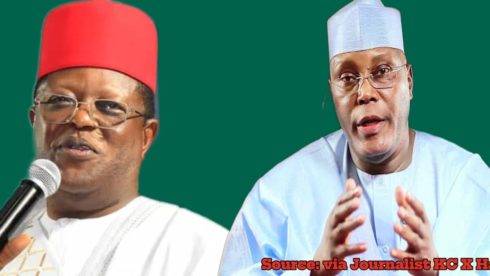The Minister of Works, David Umahi, has responded to the criticism leveled by former Vice President Atiku Abubakar, defending the contract’s procurement process as being in line with due diligence and legal requirements. The high-stakes infrastructure project, spanning 700 kilometers and envisioned as a 10-lane highway, has been at the center of heated political debates.
In a detailed statement, David Umahi clarified that the project was conceived as an Engineering, Procurement and Construction plus Financing (EPC+F) initiative, a model that entails partial funding by the Federal Government. This approach, he asserted, aligns with the government’s commitment to transparent and accountable practices in the execution of critical infrastructure projects.
David Umahi Emphasises Adherence to Procurement Laws and Regulations
Minister David Umahi emphasized that the approval process for the Lagos-Calabar Coastal Road contract followed the prescribed legal channels, involving rigorous scrutiny by the Bureau of Public Procurement (BPP) and the Federal Executive Council (FEC). He stated, “The approval process went through the Bureau of Public Procurement (BBP) after consideration by the Federal Executive Council (FEC) as prescribed by law.”
The Minister David Umahi further explained that the project was initiated as an unsolicited bid under the EPC+F model, wherein the investor provides designs, partial financing, and construction, while the Federal Government contributes counterpart funding. David Umahi revealed that the ministry received such a bid, processed it, and subsequently sent it to the BPP for evaluation in accordance with the Procurement Act.
Competitive Pricing and Cost Optimization
Addressing concerns over the project’s cost, David Umahi highlighted the rigorous price evaluation conducted by the BPP. He stated, “The BPP worked on it according to the Procurement Act and came up with a price slightly lower than the ministry’s price and even lower than the cost of similar projects awarded five years ago like the Bodo-Bonny project.”
This competitive pricing, David Umahi asserted, underscores the government’s commitment to ensuring value for money and optimizing resources in the execution of critical infrastructure projects. Furthermore, he affirmed that the BPP issued a certificate of no objection to the Ministry of Works, paving the way for the project’s approval by the Federal Executive Council.
Environmental and Social Impact Assessment
Responding to concerns about the project’s environmental and social impact, David Umahi clarified the status of the Environmental and Social Impact Assessment (ESIA) report. He stated, “Preliminary approval was issued in December 2023 by the Ministry of Environment and renewed in January. The ESIA certification is progressive, and they have a certified ESIA to start the project.”
David Umahi further elaborated on the efforts undertaken to mitigate the project’s impact on local communities and existing infrastructure. He revealed that the route had been redesigned to “put a human face to the decision and minimize demolition of permanent infrastructure.” Additionally, he emphasized the ongoing stakeholder engagement process, stating, “The process of ESIA involves constant stakeholders’ engagement, of which many have taken place, and I even participated in two in Lagos.”
Compensation and Property Rights Considerations
Addressing concerns over potential displacement and compensation, David Umahi outlined the government’s approach to handling property rights along the project’s route. He stated, “The removal of properties along the route is subject to the rule of law, and clarified that only property owners with proven titles will receive compensation.”
David Umahi further clarified that shanties and properties within the 250-meter shoreline setback without a Federal government title would not be compensated, as it is a legal matter. He also shed light on the committee’s role, stating, “The committee is not in charge of ramp or anything else but to verify those to be paid compensation, authenticate and pay. Where there is a title problem, it will need a presidential waiver for such to be paid.”
Commitment to Transparency and Accountability
Throughout his statement, David Umahi emphasized the government’s commitment to transparency and accountability in the execution of the Lagos-Calabar Coastal Road project. By providing detailed explanations of the procurement process, environmental considerations, and compensation mechanisms, the Minister, David Umahi sought to allay concerns and reassure stakeholders of the project’s adherence to legal and ethical standards.
As the nation gears up for this ambitious infrastructure initiative, David Umahi’s response underscores the government’s determination to address challenges head-on and ensure that the project benefits the country while upholding the principles of good governance. With the spotlight firmly on this high-profile undertaking, the Minister’s assurances aim to instill confidence in the government’s ability to deliver on its promises while safeguarding the interests of all stakeholders involved.
Table of Contents
Discover more from OGM News NG
Subscribe to get the latest posts sent to your email.














